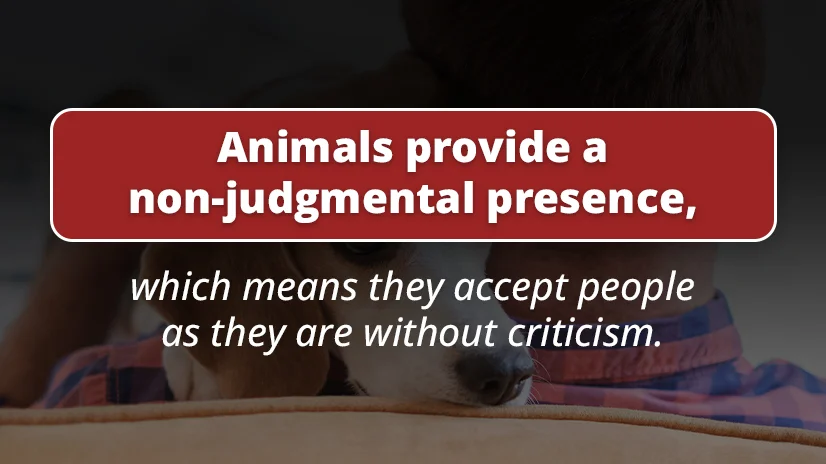
Pet Therapy And Its Impact On Mental Health
Pet therapy is a therapeutic intervention where animals help individuals cope with various mental health challenges. This practice leverages the natural bond between humans and animals to promote emotional well-being and alleviate symptoms of anxiety, depression, and stress.
In therapeutic settings, trained animals assist therapists in engaging clients in activities that promote mindfulness, social interaction, and emotional expression. This article provides valuable insights into how animals facilitate emotional healing and support for individuals facing mental illnesses.
Key Takeaways
Pet or animal-assisted therapy utilizes animals to enhance emotional, social, and physical health. Here’s what you need to know:
- Common therapy animals include dogs, cats, horses, rabbits, and even dolphins, each offering unique benefits.
- Interacting with therapy animals can alleviate symptoms of depression by boosting mood and providing companionship.
- Therapy pets undergo rigorous training and certification to ensure they can effectively interact with individuals.
Find hope and support at Indiana Center for Recovery. Call (844) 650-0064 to begin your journey to mental health recovery today.

Introduction To Pet Therapy
Pet therapy, also known as animal-assisted therapy (AAT) or animal-assisted interventions (AAI), involves using trained animals to assist individuals with various therapeutic needs. This approach harnesses the unique human-animal bond to improve physical, emotional, cognitive, and social functioning.
In more recent history, animal-assisted therapy gained recognition in the mid-20th century, initially with the rehabilitation of soldiers returning from World War II. The therapeutic benefits observed led to further research and formalization of animal-assisted activities in various therapeutic disciplines.
Pet therapy can use animals of different types, each chosen based on the therapeutic goals and the preferences and needs of the participants. Therapy dogs are the most commonly used animals due to their social nature, trainability, and ability to bond closely with humans.
Other animals, such as birds, rabbits, and even dolphins, have been incorporated into therapy programs based on the benefits they can offer. Animal therapy continues to gain recognition for its encouraging impact on mental health, making it a valuable adjunct to traditional therapeutic approaches.
Mechanisms Behind Pet Therapy
Pet therapy operates on several mechanisms that contribute to its therapeutic benefits. Understanding these mechanisms shows why animal interactions can improve mental health conditions.
Physical Contact And Oxytocin Release
One key mechanism in pet therapy is the physical contact between individuals and companion animals. When people pet or cuddle animals, their bodies release a hormone called oxytocin. Oxytocin is often called the “bonding hormone” because it helps people feel more connected and trusting.
This hormone can lessen stress and anxiety levels, promoting a sense of calm and well-being in individuals during pet therapy sessions.
Non-judgmental Presence And Emotional Support
Animals provide a non-judgmental presence, which means they accept people as they are without criticism. This unconditional acceptance promotes emotional healing and encourages individuals to open up emotionally. The calming presence of animals can soothe anxiety and isolation, offering emotional support during difficult times.
Routine And Responsibility In Animal Care
Participating in pet therapy often involves activities like feeding, grooming, or walking the animals. Specific tasks create a sense of routine and responsibility for individuals engaging in treatment. For those experiencing mental health disorders or recovering from trauma, having tasks related to animal care can provide structure to their day. They can also improve their self-esteem and enhance their sense of accomplishment.
These mechanisms underscore the multifaceted benefits of pet therapy, highlighting its role in promoting emotional well-being and enhancing cognitive health.
Benefits Of Pet Therapy For Mental Health
Pet therapy offers a holistic approach to mental health treatment, complementing traditional therapies by leveraging the therapeutic benefits of human-animal interactions. Here are the benefits of animal-assisted therapy:
Reducing Stress And Anxiety
Interacting with animals in pet therapy settings has been shown to minimize stress and anxiety levels. The calming presence of an animal and the tactile sensations of petting or holding them can lower cortisol levels, which are linked with stress. This effect can be mostly beneficial in situations where individuals are coping with acute stressors or chronic anxiety disorders.
Alleviating Symptoms Of Depression
Pet therapy can help alleviate symptoms of depression by providing companionship and emotional support. The bond formed with animals can reduce feelings of loneliness and sadness. Playing with pets or caring for them can also increase dopamine and serotonin levels. These neurotransmitters assist in mood regulation and promote feelings of comfort.
Enhancing Social Interaction
Pets can serve as social facilitators, helping individuals in therapy or group sessions engage more comfortably with others. Animals often act as conversation starters and can reduce social barriers, making connecting and communicating with peers or therapists easier. This enhanced social interaction can improve self-esteem and reduce feelings of isolation.
Improving Emotional Well-Being
Pet therapy promotes emotional well-being by fostering positive emotions and reducing negative ones. The unconditional love offered by animals can boost self-confidence and resilience. Additionally, the structured nature of pet therapy activities can provide a sense of purpose and accomplishment, contributing to overall emotional stability and satisfaction.
By integrating pet therapy into mental health care, individuals can experience improved emotional well-being and a greater quality of life.
Pet Therapy For Specific Populations
Pet therapy has been demonstrated to be an effective and versatile therapeutic approach, offering tailored benefits for various populations. Here, we explore how:
Children And Adolescents
Animals can help young people feel more at ease in therapeutic settings, making it easier for them to express their feelings and engage in therapy. For children with developmental disorders or those who have experienced trauma, interacting with emotional support animals can improve social skills, reduce anxiety, and promote a sense of security and trust.
Older Adults
For older adults, especially those in nursing homes or assisted living facilities, pet therapy can significantly enhance their quality of life. Animals can provide companionship and reduce feelings of loneliness and isolation.
Interacting with pets can stimulate physical activity, improve mood, and enhance cognitive function. Therapy animals can evoke positive memories and emotions in those with dementia or Alzheimer’s disease.
Individuals With PTSD
Pet therapy is an effective intervention for individuals with post-traumatic stress disorder (PTSD). The calming presence of animals can help reduce hypervigilance and anxiety, common symptoms of PTSD. Therapy animals provide a sense of safety and grounding, assisting persons to manage their emotional responses and build coping strategies.
Patients With Chronic Illnesses
Patients with chronic illnesses often face long-term physical and emotional challenges. Pet therapy can significantly improve their well-being by providing emotional comfort and reducing stress. Therapeutic interaction with animals can distract from pain, lessen symptoms of depression and anxiety, and enhance motivation for physical activity and rehabilitation.
Therefore, integrating pet therapy into a treatment plan can improve health outcomes and enhance the quality of life for those in need.
Implementation Of Pet Therapy
Implementing pet therapy requires careful planning and coordination to ensure it effectively meets individual needs. Key components of animal-assisted therapy include:
Training And Certification For Therapy Pets
Therapy pets undergo rigorous training and certification to ensure they can interact safely and effectively with needy individuals. This process includes obedience training, socialization, and exposure to various environments. Certification organizations assess the animals’ temperament, behavior, and ability to provide comfort and support.
Different Settings For Pet Therapy
Pet therapy can be implemented in various settings to benefit those most. Common settings include hospitals, nursing homes, schools, and rehabilitation centers. Each environment offers unique opportunities for therapy pets to interact with individuals, providing comfort and support in ways that complement traditional treatments.
Role Of Pet Handlers And Therapists
Handlers and therapists play crucial roles in the success of pet therapy programs. The animal’s handler is responsible for the appropriate care, training, and management of therapy animals, ensuring their well-being and proper behavior during sessions. Therapists integrate pet therapy into treatment plans, guiding interactions to achieve therapeutic goals.
Challenges And Considerations For Pet Therapy
Allergies And Phobias
One of the primary challenges in pet therapy is managing allergies and phobias. Some individuals may have allergic reactions to animal fur or dander, which can cause discomfort or health issues. Additionally, others might have a fear of animals that could make interactions stressful rather than therapeutic. It is essential to screen participants for these issues beforehand to ensure a safe and positive experience.
Ethical Concerns And Animal Welfare
Ethical concerns and the welfare of therapy animals are critical considerations in pet therapy. Ensuring that animals are not overworked, stressed, or placed in harmful situations. Proper care, regular breaks, and monitoring for signs of distress are necessary to maintain the health and well-being of therapy animals.
Limitations And Contraindications
Pet therapy has its limitations and contraindications that must be taken into account. Not all individuals, such as those with severe allergies, phobias, or certain medical conditions, may benefit from or be suitable for pet therapy. Additionally, some therapeutic settings may not be appropriate for animals, requiring alternative approaches.
Frequently Asked Questions (FAQ)
How does pet therapy help mental health?
Pet or animal-assisted therapy benefits mental health by providing companionship, reducing loneliness, and lowering stress levels. Interacting with animals can increase oxytocin levels, which promotes feelings of trust and bonding.
It also encourages physical activity and social interaction, improving mood and self-esteem. For individuals with various conditions like depression or anxiety, pets offer non-judgmental support and a sense of purpose. A pet’s caring routine can also add structure to daily life, offering stability and reducing symptoms of psychological distress.
Can pets help your mental health?
Pets can significantly benefit mental health. Research shows that owning pets like dogs or cats can reduce stress, anxiety, and depression. Animals offer companionship and unconditional love, which can prevent feelings of loneliness and increase feelings of happiness.
Caring for a pet also fosters a sense of purpose and routine, encouraging physical activity and social interaction. Moreover, the presence of pets is linked to lower blood pressure and improved overall cardiovascular activity. Overall, the connection between humans and pets can have profound positive effects on mental well-being.
How does pet therapy work for individuals with anxiety or depression?
Pet therapy, or animal-assisted therapy, benefits individuals with anxiety or depression by providing companionship and emotional support. Interacting with animals can reduce stress levels, anxiety disorders, and feelings of loneliness, promoting relaxation and a sense of well-being.
The presence of pets can elevate mood levels and decrease symptoms of anxiety and depression through activities like petting, playing, or simply being in their company. This therapeutic approach can also encourage social interaction and a sense of responsibility, promoting overall emotional comfort and potentially reducing the need for medication in some cases.
Grounding Care That Echoes the Comfort of Pet Therapy
You can capture the calm, companionship, and routine described on this page through Indiana Center for Recovery’s integrated care—our mental health treatment teams coordinate with inpatient psychiatric services when symptoms surge, layer in immersive residential treatment when deeper healing helps, sustain momentum via outpatient treatment, and keep substance use in check through dual diagnosis treatment, so the emotional relief you read about stays anchored in medical expertise.
Treatment centers across Indiana keep those supports coordinated with licensed clinicians, care coordinators, and benefits navigation; Call us right now at (844) 650-0064 to start a recovery plan that blends comfort with proven care.



 100% Confidential
100% Confidential
